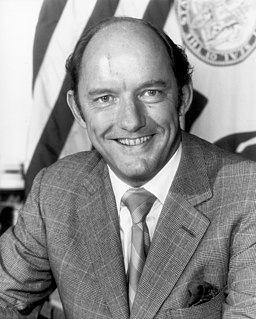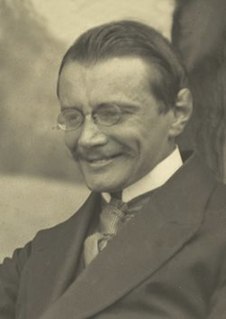A Quote by Aristotle
Property should be in a general sense common, but as a general rule private... In well-ordered states, although every man has his own property, some things he will place at the disposal of his friends, while of others he shares the use of them.
Related Quotes
In the latter sense, a man has a property in his opinions and the free communication of them. He has a property of peculiar value in his religious opinions, and in the profession and practice dictated by them. He has an equal property in the free use of his faculties and free choice of the objects on which to employ them. In a word, as a man is said to have a right to his property, he may be equally said to have a property in his rights.
I want everyone to keep the property that he has acquired for himself according to the principle: benefit to the community precedes benefit to the individual. But the state should retain supervision and each property owner should consider himself appointed by the state. It is his duty not to use his property against the interests of others among his own people. This is the crucial matter. The Third Reich will always retain its right to control the owners of property.
One ideological claim is that private property is theft, that the natural product of the existence of property is evil, and that private ownership therefore should not exist... What those who feel this way don't realize is that property is a notion that has to do with control - that property is a system for the disposal of power. The absence of property almost always means the concentration of power in the state.
The difference between [socialism and fascism] is superficial and purely formal, but it is significant psychologically: it brings the authoritarian nature of a planned economy crudely into the open. The main characteristic of socialism (and of communism) is public ownership of the means of production, and, therefore, the abolition of private property. The right to property is the right of use and disposal. Under fascism, men retain the semblance or pretense of private property, but the government holds total power over its use and disposal.
Each pursues his private interest and only his private interest; and thereby serves the private interests of all, the general interest, without willing it or knowing it. The real point is not that each individual's pursuit of his private interest promotes the totality of private interests, the general interest. One could just as well deduce from this abstract phrase that each individual reciprocally blocks the assertion of the others' interests, so that, instead of a general affirmation, this war of all against all produces a general negation.
Ownership by delegation is a contradiction in terms. When men say, for instance (by a false metaphor), that each member of the public should feel himself an owner of public property-such as a Town Park-and should therefore respect it as his own, they are saying something which all our experience proves to be completely false. No man feels of public property that it is his own; no man will treat it with the care of the affection of a thing which is his own.
Civil rights, as we may remember, are reducible to three primary heads; the right of personal security; the right of personal liberty; and the right of private property. In a state of slavery, the two last are wholly abolished, the person of the slave being at the absolute disposal of his master; and property, what he is incapable, in that state, either of acquiring, or holding, in his own use. Hence, it will appear how perfectly irreconcilable a state of slavery is to the principles of a democracy, which form the basis and foundation of our government.
For a man's property is not at all secure, though there be good and equitable laws to set the bounds of it, between him and his fellow subjects, if he who commands those subjects, have power to take from any private man, what part he pleases of his property, and use and dispose of it as he thinks good.
By Liberty I understand the Power which every Man has over his own Actions, and his Right to enjoy the Fruits of his Labour, Art, and Industry, as far as by it he hurts not the Society, or any Members of it, by taking from any Member, or by hindering him from enjoying what he himself enjoys. The Fruits of a Man's honest Industry are the just Rewards of it, ascertained to him by natural and eternal Equity, as is his Title to use them in the Manner which he thinks fit: And thus, with the above Limitations, every Man is sole Lord and Arbitrer of his own private Actions and Property.
The right to life is the source of all rights -- and the right to property is their only implementation. Without property rights, no other rights are possible. Since man has to sustain his life by his own effort, the man who has no right to the product of his effort has no means to sustain his life. The man who produces while others dispose of his product, is a slave.
And the desire to own property, to take for ourselves things which in no way belong to us, does not stop short at the sun. The air is already bought and sold as a commodity, by health resorts. And what of water? Or waterpower? Why should the earth be parceled out into private hands? Is it any different from the sun? No; the earth belongs to the people who live on it. God intended it for them, but it has been taken over by private individuals. Privare means to steal. Thus private property is stolen property - property stolen from God and from humankind!







































